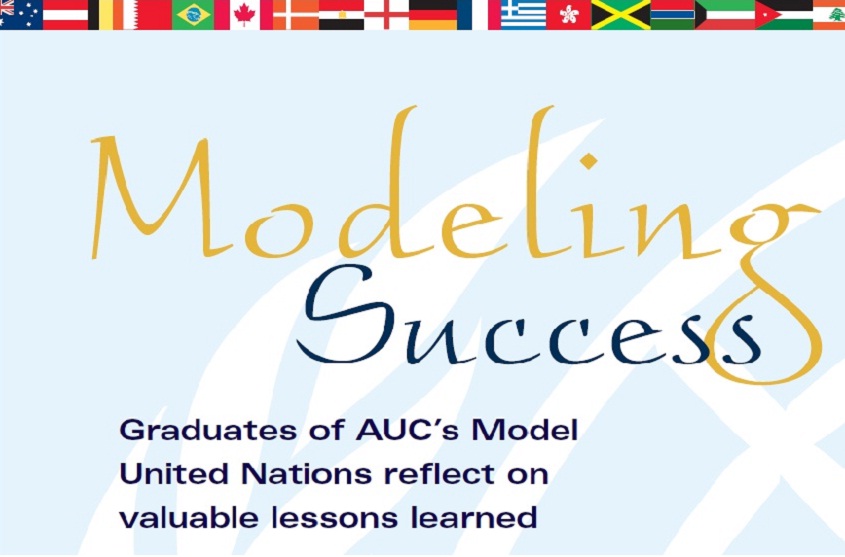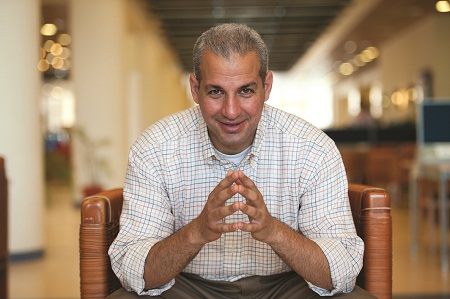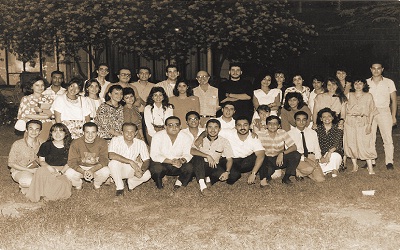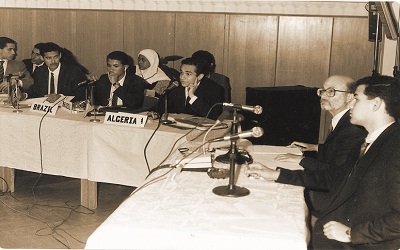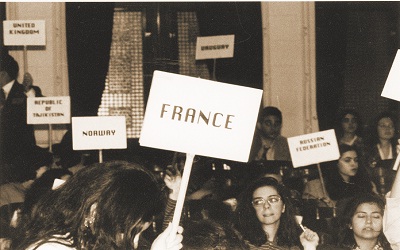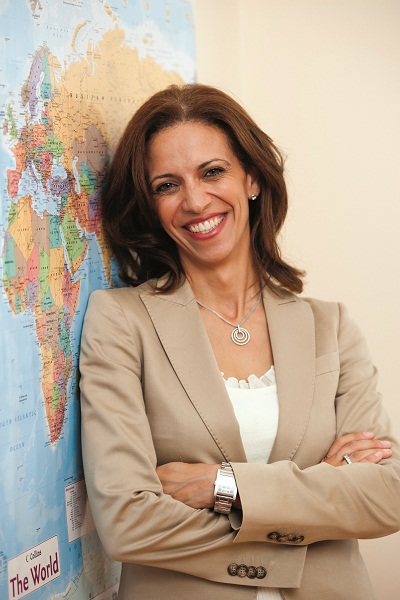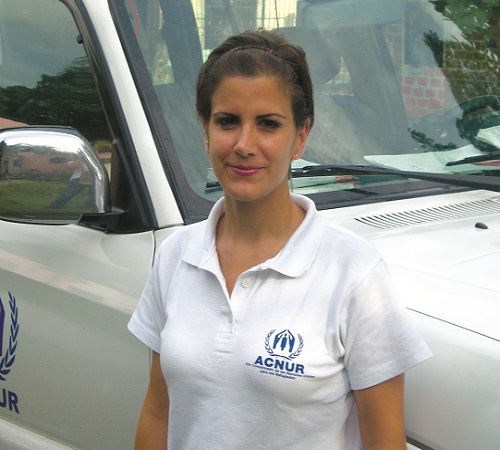|
|||||||||||||||||||||||||||||||||||||
In 1989, AUC was invited by the United Nations Association to send a Model United Nations (MUN) delegation to Moscow. Tim Sullivan, provost emeritus and former political science professor who had experience with MUN as an undergraduate and as faculty adviser at U.S. universities, recruited a number of distinguished AUC students and flew to Moscow. Led by Mohamed El
Farnawany ’89, the AUC team did well, and upon returning to Cairo, El Farnawany approached Sullivan about starting an MUN program at the university. Sullivan agreed and for months, he taught students how to organize a debate, chair a meeting, and deal with the protocols of discussion and resolutions. The culmination was the first Cairo International Model United Nations (CIMUN) conference hosted on campus that year, with El Farnawany as secretary-general. The conference, which was held at Hill House with approximately 45 members, was a simulation of the Model Security Council, and students from other universities in Egypt were invited to join. “It was a collaborative effort by a handful of dedicated enthusiasts; everyone did everything,” said El Farnawany ’89, who received the Parents Association Cup from AUC in 1989 and now works as deputy chief of mission at the Egyptian Embassy in Paris. “Someone would be a delegate for one hour, and the next hour, they would be in the organizing committee serving food and beverages and at the same time writing and editing the MUN handbook.” Today, CIMUN has flourished to become the largest and most prestigious Model United Nations conference in Africa and the Middle East, as well as the largest student-run activity on campus with more than 500 members. What began as a single simulation of the United Nations Security Council has grown to include several major UN fields of operation. Each year, participants engage in lively discussions about a variety of challenging and controversial topics on the agenda of the UN and international community, paving the way for many to occupy leading posts in foreign diplomacy and public service after graduation.
“CIMUN prepared me for the real UN,” said El Farnawany, who earned his master’s in international relations from the University of Cambridge and worked for several years at the Egyptian Mission to the United Nations in New York and as senior officer in the UN secretary general’s high-level panel on system-wide coherence. “It raised students’ awareness of issues and increased their responsibility to act. It helped them develop skills such as research, negotiation, public speaking and organization of events. It also allowed them to engage in lively and substantive debates on political and economic issues that directly affect the daily lives of people around the world. When you are young and develop these kind of skills, as well as a better understanding of the dynamics of interaction on an interpersonal and international level, it prepares you for the real world where you can help make a difference in the lives of people in need.” Echoing the same sentiment, Sullivan noted, “The Model UN at AUC started as an experiment and is now an institution. I wanted to use it, and the Model Arab League, to teach students how to think creatively out of the box, how to take responsibility for their actions, and how to organize and manage a program. I think it has been a marvelous success, and I am very proud of all the students who have benefited from participating in it over the years.” Throughout the history of CIMUN, AUC teams have taken part in the international Model United Nations competition in New York, receiving distinguished delegation awards and honorable mention several times. This year, they were the only Arab delegation to receive the Outstanding Delegation Award for representing Egypt, competing against more than 200 universities from around the world. The award was also granted to other reputable universities such as the University of Illinois at Springfield, Georgia State University, California State University and L’Université du Québec à Montréal. This is the second time AUC won the top prize –– the first was in 2006 when students represented South Africa. In addition, AUC’s team received the council award this year for being one of the top three performers in the General Assembly Second Committee Council, defeating 191 other delegations. According to Maye Kassem, associate professor of political science and CIMUN faculty adviser, the Outstanding Delegation Award recognizes the ability of students to be realistic in terms of their policy proposals and debate, and is determined by the amount of research conducted by students. “To win first prize, this puts our students in the spotlight and puts AUC on the map,” said Kassem. “It also shows that we have smart students who are serious, intelligent, focused and who participate in international competitions.” As Omar El Nayal ’09, graduate adviser for this year’s CIMUN, put it, “Through MUN, you engage in a learning experience that truly shapes your personality and raises your awareness. You are exposed to issues of contention on a political, economic and social level.You experience the implications of being a diplomat defending your foreign policy.You understand the dynamics of debating and negotiating as you attempt to form alliances and blocs within the council. You compromise, you cooperate and you fight for your right. This is the beauty of it.”
Former CIMUN members testify to this. Shaden Khallaf ’98, ’04, who has worked for the past 12 years at the United Nations High Commissioner for Refugees (UNHCR), noted that MUN conferences were not only about discussions and debates, but also about organizing a huge event from scratch. This includes researching United Nations rules, writing background papers, preparing sessions, interviewing delegates, designing and editing publications, raising funds, seeking sponsors and engaging the media. “I learned a lot about time management, fitting everything into a tight schedule, allocating the right amount of time to tasks according to their priority, working in a team, and empowering and helping people make the most out of their experience,” said Khallaf, also a recipient of the Parents Association Cup from AUC in 1998 who served as secretarygeneral of CIMUN, president of the human rights commission, president of the International Court of Justice at the National MUN in New York as well as graduate adviser to CIMUN. “I joined UNHCR right after graduating from AUC, and my CIMUN experience was still very fresh in my mind,” Khallaf said. “I immediately knew that this was what I had always wanted to do. Thankfully, I found that CIMUN had prepared me well for the work ahead of me by strengthening my writing skills and analytical thinking. This helped a lot since a large portion of my job included research and writing policy papers. CIMUN also provided me with excellent exposure to the international legal framework within which the United Nations operates and how that impacts peoples’ lives on a daily basis, which was extremely relevant to my work at UNHCR.” Through her work in the Middle East and North Africa Bureau at UNHCR’s headquarters in Geneva, Switzerland, as well as through her assignments and travel throughout Lebanon, Iraq and other countries in the Middle East, Khallaf has been extensively involved in the Iraqi displacement problem and the resulting humanitarian crisis in Iraq and surrounding countries. Her experience with UNHCR has included core protection work, such as refugee status determination for individual asylum seekers and finding durable solutions for refugees, as well as broader scale advocacy, communications work and strategic planning. “What makes my job gratifying is that we are helping to make a difference in the lives of the most vulnerable, trying to be an agent of positive change and working to uphold the principles of justice, dignity and human rights for all,” she said. Also working at the UNHCR is Reem Al Salem ’97, ’00 who joined the organization while she was a master’s student at AUC, describing it as a “long-lasting love affair.” Currently serving as head of the UNHCR sub-office for the Caribbean in Barranquilla, Northern Colombia, Al Salem works to ensure that internally displaced people and those at risk of displacement are able to enjoy their rights under Colombian and international law. “I’ve always wanted to join the United Nations since I was a child because I loved its multilateral world and wanted to be a part of it,” she said. “Through my work, I have fulfilled my desire to help people who are not as fortunate in their lives as I am. In fact, since we deal with victims of war and violence on a daily basis, I get a daily reminder of how lucky I am and of how many things we take for granted,” noted Al Salem, who has worked in more than 10 duty stations ranging from Afghanistan, Eritrea and Indonesia to Egypt, Iraq and the UNHCR headquarters in Switzerland.
As an undergraduate, Al Salem was “addicted” to both CIMUN and the Cairo International Model Arab League (CIMAL). She participated in CIMAL every fall semester and in CIMUN during the spring. She also served as president of CIMUN’s International Court of Justice and judge at the National Model United Nations in New York. “I did everything, from delegate to chair to secretary-general, and each time was a new experience through which I learned and grew on a personal and academic level,” reflected Al Salem. “CIMUN and CIMAL expanded my horizons. I learned about things that I didn’t know before, developed the skill of how to represent and articulate my point of view, as well as how to negotiate, and how and when to compromise. Most importantly, I was introduced to the complex world of managing a project and managing others.” Al Salem was also part of the emergency response teams in Darfur in 2004, in Pakistan following the 2005 earthquake and in Lebanon during the 2006 war. Working in such risky environments has never deterred Al Salem. “Being with UNHCR is far from being a circus ride,” she said. “We work long hours and often in dangerous areas. We get exposed to tragic stories of suffering. We lose colleagues and friends on the way. Over the last few years, humanitarian space has been shrinking, making it more difficult for us to do our job. Increasingly, we are being targeted and shot at. Yet, I have never regretted the path that I have chosen. Being a humanitarian worker is not a job. It is a conviction, a passion, a calling. It has been and continues to be worth it.”
|
|||||||||||||||||||||||||||||||||||||
